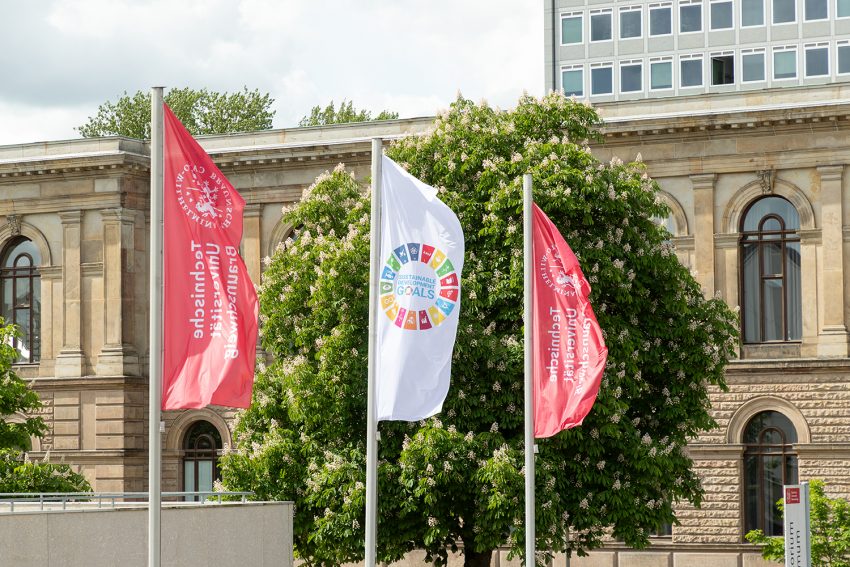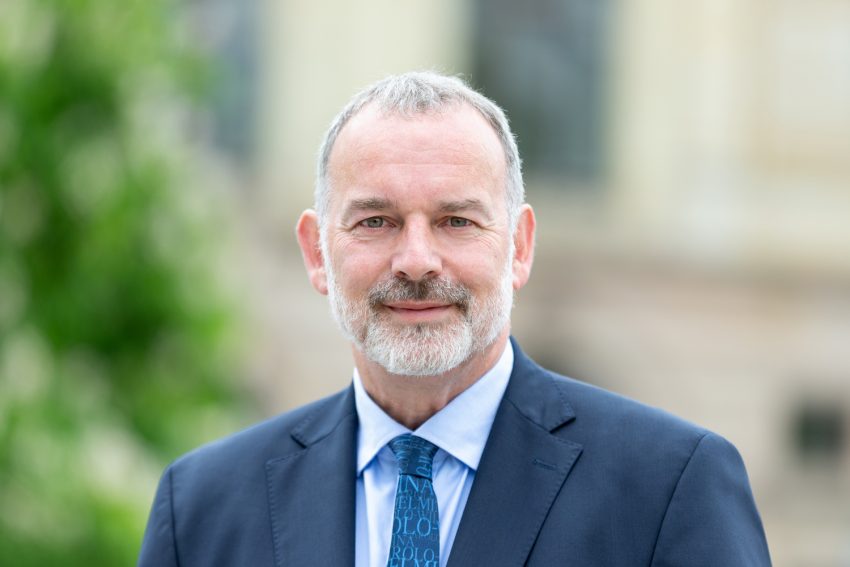A visible commitment to sustainability in practice TU Braunschweig raises the flag of the UN Sustainable Development Goals
Technische Universität Braunschweig is sending a clear signal: by raising the flag of the UN Sustainable Development Goals (SDGs) on the university square, TU Braunschweig is publicly committing itself to its responsibility for sustainable development on its path to becoming a climate-neutral university. Behind this symbolic act lies a profound and long-term strategy.

By raising the flag of the UN Sustainable Development Goals on the university square, TU Braunschweig is publicly committing itself to sustainable development on its path to becoming a climate-neutral university. Photo credits: Kristina Rottig/TU Braunschweig
“Sustainability in practice at our university is not a restriction, but an essential prerequisite for our future performance,” says Professor Manfred Krafczyk, Vice President for Digitalisation and Sustainability at TU Braunschweig. “It’s about taking responsibility – and taking concrete steps together as a university community.” Since the establishment of a Sustainability Working Group in 2019, the topic has gained significantly in importance at TU Braunschweig. With the introduction of a Sustainability Council, sustainability has been firmly anchored in the university’s strategic areas. Today, it is an integral part of the university’s development concept, and since 2024, Professor Krafczyk has been the university’s own climate protection officer. The sustainability strategy is based on the ‘whole institution approach.’ Sustainability is to be consistently considered and practised in teaching, research, transfer, administration and governance.
From symbol to substance
By raising the SDG flag, TU Braunschweig now wants to make a public commitment. Especially now, “when the relevance and urgency of sustainability is increasingly being questioned in many countries and also in parts of our society, we want to take a stand as a scientific institution,” explains Professor Krafczyk. The 17 goals represent the global complexity of the issue – and the university’s clear position: “Sustainability is not just a buzzword, but a central paradigm at TU Braunschweig.”
With its sustainability strategy, TU Braunschweig integrates all dimensions of sustainability – ecological, social and economic – with a focus on climate protection. The SDGs play an important role in making the global complexity of many issues more understandable and form the basis for the work of the Green Office, the sustainability office at TU Braunschweig – for example in the field of education for sustainable development (ESD) or as part of the ambassador programme.
As Vice President for Digitalisation and Sustainability, Professor Manfred Krafczyk is responsible for developing and implementing the sustainability strategy at TU Braunschweig. Photo credits: Kristina Rottig/TU Braunschweig
Participation as a principle
The university attaches great importance to the broad participation of all university groups. The perspectives of students, staff and researchers have been and continue to be actively incorporated into workshops, surveys and projects. The Sustainability Council brings together representatives from all university status groups and an advisory body from the business community. Students are actively involved through their own representatives and the AStA (student union) – not only in an advisory capacity, but also with direct influence on decision-making processes and resolutions.
The presentation of the TUmorrow Awards, the Fairtrade University award and the extensive ‘Sustainability’ lecture catalogue show that sustainability is firmly integrated into everyday university life. Concrete measures are already being implemented, particularly in areas such as energy-efficient new buildings, renovations and the expansion of photovoltaics. TU Braunschweig integrates digitalisation and sustainability as complementary cross-cutting themes. “Digital tools help to implement efficient building and energy management and transform our IT towards energy efficiency and waste heat utilisation,” says Professor Krafczyk. The university also actively contributes to climate protection in research, for example on climate-friendly mobility and sustainable construction.
Roadmap to climate neutrality
A central element of the strategy is the ‘CO₂ neutrality roadmap,’ which systematically pursues the goal of a climate-neutral university in the first half of the 2030s – not through mere compensation, but through substantial change. “It contains concrete data on our emissions and shows where there is potential for savings in the coming years and what short- and long-term measures can be developed,” explains Professor Krafczyk. An integrated climate protection concept and a coherent, regular greenhouse gas balance sheet are to be developed in the coming months. Until then, the university will follow the legal requirements of the state of Niedersachsen, which envisage CO₂ neutrality at a much later date, in 2040.
One challenge is the energy intensity associated with excellent research and the ongoing operation of a university. “TU Braunschweig consumes about as much energy as a small town,” says Professor Krafczyk. Targeted and well-thought-out measures, extensive funding and good communication between the various stakeholders are therefore essential. “Sustainability always involves a bit of persuasion – we need to close knowledge gaps, raise awareness of concrete implementation options and clearly communicate the relevance and urgency of the issue time and again.”
Working together for a sustainable future
Sustainable development is seen as a joint project at TU Braunschweig. This is also reflected in its cooperation with external partners. The university works closely with other universities in Niedersachsen in the Niedersachsen University Sustainability Network (HochNiNa) and learns from international partners in the International Sustainable Campus Network (ISCN). In future, the TU will be a founding member of the Braunschweig Climate Protection Network. Professor Krafczyk also sees great potential in this alliance of cities, companies and associations in the field of climate protection: “It’s about learning from each other and developing solutions together – together we can achieve a lot in terms of sustainability, which is perhaps the most important message of all.”

